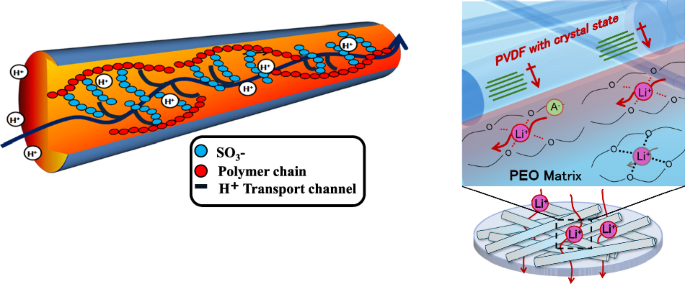Advancements in Polymer Electrolyte Membranes for Energy Conversion Devices
Key Ideas
- Polymer electrolyte membranes based on polymers show promise for energy demand due to their sustainability and cost-effectiveness.
- Research on composite electrolyte membranes with polymer nanofibers and matrix improves ion conductivity and durability for applications in fuel cells and batteries.
- Focus on developing ultrathin polymer electrolyte membranes with high proton conductivity and durability for next-generation fuel cell vehicles and lithium-ion batteries.
Polymer electrolyte membranes based on polymers are gaining popularity for energy conversion devices due to their sustainable and cost-effective nature. However, challenges such as low ion conductivity and trade-offs between performance and durability exist for traditional polymer electrolyte membranes. Recent research on composite electrolyte membranes incorporating polymer nanofibers has shown improved ion conductivity, durability, and the ability to produce thinner membranes. These advancements are expected to have applications in fuel cells, water electrolysis, all-solid-state Li-ion batteries, and Li-air batteries. The New Energy and Industrial Technology Development Organization (NEDO) of Japan has released a Fuel Cell Technology Development Roadmap for Heavy-Duty Vehicles, emphasizing the need for advancements in fuel cell component technologies. The roadmap includes target values for catalysts, electrolytes, and gas diffusion layers, highlighting the importance of fabricating thin membranes with high durability and proton conductivity at elevated temperatures. To address challenges in traditional PEMs, next-generation membranes are required to exhibit superior proton conductivity and durability while being less than 8μm thick. Additionally, advancements in polymer electrolyte membranes are crucial for the development of all-solid-state lithium-ion batteries (ASSLIBs) and meeting the increasing demand for rechargeable batteries in electric vehicles and high-energy-demand devices. The focus is on developing ultrathin polymer electrolyte membranes with high proton conductivity to enhance the performance and safety of energy storage technologies.
Topics
Fuel Cells
Sustainable Energy
Battery Technology
Fuel Cell Technology
Energy Conversion
Polymer Membranes
Latest News
